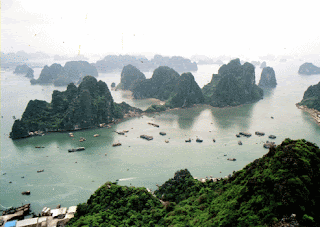The main goal of the camp is to raise the awareness of the local population about the preservation of the natural site of Ha Long Bay by running and promoting concrete activities to protect its environment. Local youth and tourists will constitute the main target group of the non-formal education actions that will be organised by the international and local young volunteers, with also a focus on University students from the capital as potential actors of change.
 |
| Ha long Bay |
Choosing activities that give visibility to the youth efforts to preserve World Heritage the camp also aims at sensitising the local government on the important role that young people can play for the promotion and protection of Ha Long Bay. The involvement of local environmental organisations aims at multiplying the positive impact of the first World heritage camp held in 2008 and guarantees an important role to the local community to develop and implement long-term strategies in heritage conservation.
Volunteers will run a series of demonstrative actions, from planting 100 trees in Ha Long to a bicycle
ride to promote environmentally friendly transportation among tourists and locals, and to garbage collection along Ha Long beaches. Two World Heritage exhibitions will take place in Ha Long high schools during the camp and will also be relayed by similar activities in the main Universities of Hanoi, thus creating bridges between the country’s capital and its natural heritage. A video workshop to film the different actions will also complement and give visibility to the activities carried by the volunteers.
 |
| Ha Long Bay |
While by the end of the project the exhibitions will have provided high school and university students with a deeper knowledge of World Heritage and the current situation of Ha Long bay, the demonstrative actions will have contributed raising the awareness of the local population and the tourists visiting the site. As the process required to organise such a diverse set of activities and will have required intense partnership building and
cross-sectorial cooperation, the environmental organisations, local and national authorities and schools and
universities brought together by this project will constitute an important network to support the work of the site manager in preserving and promoting the site.
Scenery
No comments:
Post a Comment